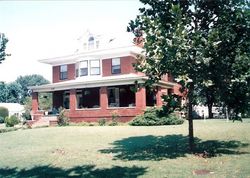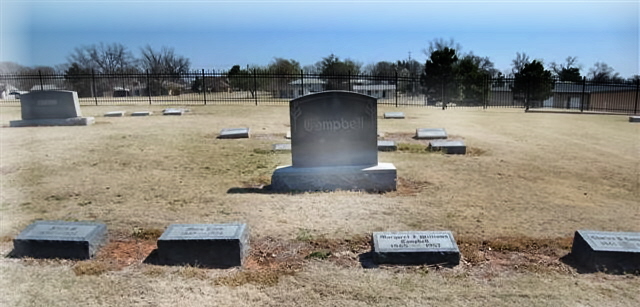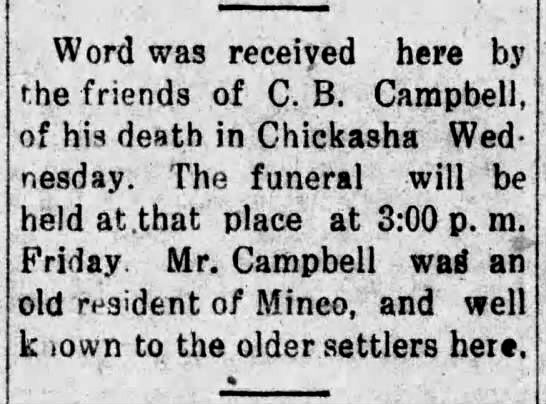In 1890 the Chicago, Rock Island and Pacific Railway built a depot on Campbell's property, around which the town of Minco was established. Most of the residents of Silver City moved to Minco where Campbell built a business block, donated to the El Meta Bond College, helped organize the bank, and opened a clothing store. In 1900 he was also a founder of the First National Bank of Chickasha. Campbell and his relatives claimed much of present Grady County and portions of McClain County. His uncle Charley Campbell operated a large ranch near Chickasha, his stepfather James Bond ranched at Silver City, his father-in-law "Caddo" Williams ran the Half Moon Ranch near Verden, and Montford Johnson and his son E. B. Johnson had ranches around Silver City and near present Newcastle and Washington. Around 1900 Campbell and E. B. Johnson purchased the Half Moon Ranch, buying all of the cattle and twelve of the horses. Before long Campbell's ranch was known for its race- and polo horses. He exported horses to England and other European countries, as well as New York City, Chicago, and St. Louis. His ranch introduced the game of polo to Oklahoma and Indian territories, with his cowboys often defeating better-dressed teams from the eastern United States. He raised Thoroughbred racehorses including Bowling Green, Mint, Black Toney, and Bear. His best remembered horse, U-See-It, which he sold for little money, foaled Black Gold for the Hoots Ranch, with Black Toney as the father. Black Gold won the 1924 Kentucky Derby. Campbell eventually bought out E. B. Johnson and gained control of the Half Moon Ranch. In 1920 he built a large home in Chickasha, OK and then administered his ranching operations from that city. Around then he made ill-advised business deals with his cousin, Ben Johnson, and J. D. Suggs, losing most of his assets and ranch.
During the Governorship of R. L. Williams, C. B. Campbell was Treasurer of the State Board of Agriculture. He also operated a large ranch at Carlsbad, NM. When he passed, C. B. Campbell was a highly honored pioneer, rancher, banker, horse breeder, businessman, a 32nd Degree Mason and a member of the Knights Templer.
BIBLIOGRAPHY: Chickasha (Oklahoma) Daily Express, 26 February 1925. Neil R. Johnson, The Chickasaw Rancher, ed. C. Neil Kingsley (Rev. ed.; Boulder: University Press of Colorado, 2001). Joseph B. Thoburn, A Standard History of Oklahoma (Chicago: American Historical Society, 1916). "Useeit and Her Little Black Colt," Daily Oklahoman (Oklahoma City), 5 May 1935.
Death Month: Minco Historical Society "Index of Death Abstracts from Newspapers in Minco, Grady Co., OK, Jan 1924 - Dec 1946". Death notice published Feb. 26, 1925. Info provided by Glenda Eisenhour, 2011.
Personal family research: James Taliaferro Montgomery II, grandson, 1991.
[Note: This author is uncertain as to whether Charles B. Campbell built the home at 1428 Kansas Avenue in Chickasha, OK or Charles M. Hollingsworth, the first person on census records with that address, built the home.]
In 1890 the Chicago, Rock Island and Pacific Railway built a depot on Campbell's property, around which the town of Minco was established. Most of the residents of Silver City moved to Minco where Campbell built a business block, donated to the El Meta Bond College, helped organize the bank, and opened a clothing store. In 1900 he was also a founder of the First National Bank of Chickasha. Campbell and his relatives claimed much of present Grady County and portions of McClain County. His uncle Charley Campbell operated a large ranch near Chickasha, his stepfather James Bond ranched at Silver City, his father-in-law "Caddo" Williams ran the Half Moon Ranch near Verden, and Montford Johnson and his son E. B. Johnson had ranches around Silver City and near present Newcastle and Washington. Around 1900 Campbell and E. B. Johnson purchased the Half Moon Ranch, buying all of the cattle and twelve of the horses. Before long Campbell's ranch was known for its race- and polo horses. He exported horses to England and other European countries, as well as New York City, Chicago, and St. Louis. His ranch introduced the game of polo to Oklahoma and Indian territories, with his cowboys often defeating better-dressed teams from the eastern United States. He raised Thoroughbred racehorses including Bowling Green, Mint, Black Toney, and Bear. His best remembered horse, U-See-It, which he sold for little money, foaled Black Gold for the Hoots Ranch, with Black Toney as the father. Black Gold won the 1924 Kentucky Derby. Campbell eventually bought out E. B. Johnson and gained control of the Half Moon Ranch. In 1920 he built a large home in Chickasha, OK and then administered his ranching operations from that city. Around then he made ill-advised business deals with his cousin, Ben Johnson, and J. D. Suggs, losing most of his assets and ranch.
During the Governorship of R. L. Williams, C. B. Campbell was Treasurer of the State Board of Agriculture. He also operated a large ranch at Carlsbad, NM. When he passed, C. B. Campbell was a highly honored pioneer, rancher, banker, horse breeder, businessman, a 32nd Degree Mason and a member of the Knights Templer.
BIBLIOGRAPHY: Chickasha (Oklahoma) Daily Express, 26 February 1925. Neil R. Johnson, The Chickasaw Rancher, ed. C. Neil Kingsley (Rev. ed.; Boulder: University Press of Colorado, 2001). Joseph B. Thoburn, A Standard History of Oklahoma (Chicago: American Historical Society, 1916). "Useeit and Her Little Black Colt," Daily Oklahoman (Oklahoma City), 5 May 1935.
Death Month: Minco Historical Society "Index of Death Abstracts from Newspapers in Minco, Grady Co., OK, Jan 1924 - Dec 1946". Death notice published Feb. 26, 1925. Info provided by Glenda Eisenhour, 2011.
Personal family research: James Taliaferro Montgomery II, grandson, 1991.
[Note: This author is uncertain as to whether Charles B. Campbell built the home at 1428 Kansas Avenue in Chickasha, OK or Charles M. Hollingsworth, the first person on census records with that address, built the home.]
Family Members
Sponsored by Ancestry
Advertisement
Explore more
Sponsored by Ancestry
Advertisement






















